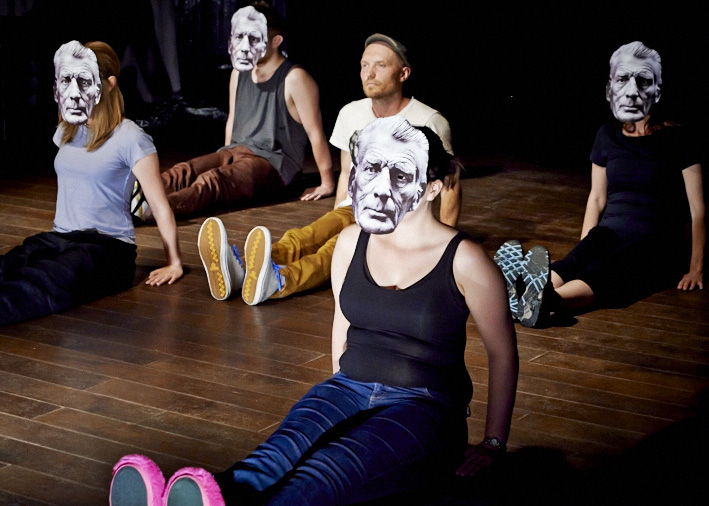By Paul Jenkins and Alma Alter Theatre Laboratory
Dempsey’s Pub Theatre
Paul Jenkins, Donna Males, Tom Wentworth,
Brent Morgan, Natalie Paisey
Directors: Paul Jenkins / Alma Alter Theatre Laboratory

Photo: Jorge Lizalde/International Performance Festival Cardiff
The inaugural International Performance Festival Cardiff, organized by director James Tyson, has been a three week run of exhibitions, music, avant-garde theatre and workshops around the Welsh capital. While Chapter Arts Centre has been the lead venue, events have taken place in theatres, clubs and bars and a couple of unusual places (like the Queens Arcade), in an attempt to explore ideas of performance and its relationship and influence to community. Some of the events attempt to engage audiences on a personal level to encourage creativity in daily life; most eschew performance and art as commodity or as finished, polished work. Either way, it all makes for lots of experimental work for which you need a pretty open mind if you’re to find any sense of meaning or engagement with the Festival events.
One such event is Paul Jenkins piece Godot Versus Beckett, a collaborative work created with Alma Alter Theatre Laboratory from Bulgaria. Jenkins has created a homage to Samuel Beckett to which Alma Alter brings the influence of experimental theatre. It is an interactive protest performance, each performance being unique; dependent on the the impulses of the actors and the responses of the audience as the work gets underway.
Jenkins opens his piece with a challenge invoking the ghost of Godot to confront his creator; to finally appear on stage, and to bring meaning to Beckett’s nihilist play, Waiting for Godot. He asks whether Godot’s non-appearance is due to the quality of waiting and subsequently subjects the audience to long, uncomfortable periods of silent waiting in which performers, anonymous in Samuel Beckett masks, sit and wait for Godot to appear. When this fails, the actors are urged to purge themselves in an attempt to exorcise Beckett from their minds. After disgorging their Beckett dialogues at speed they then turn to Shakespeare to invoke the elusive Godot. But it seems that Beckett has also infected the meaning of Shakespeare’s words and at this point Jenkins resorts to blinding himself with the juice of a lemon… (I didn’t get this either). The performers then seek Godot through dance and the bodily experience. This involves jumping on the spot until they are exhausted, and the synchronized eating of bread and jam… and the synchronized sitting on bread and jam. It is all pretty weird stuff and the audience around me are politely trying to draw some sense of meaning from the whole piece.
 It finally comes together in the final moments of the performance when Beckett hovers like a hologram in a recording in which he contemplates the clarity and the meaning of words. The big question is ‘What does it all mean?’ Beckett was searching for the answer. So is Jenkins. And so is the audience. This is a work in progress. It will be interesting to see how Jenkins develops the piece and how experimental he is prepared to go. As for the Festival, it has been an opportunity to give voice to performance and art outside institutional constraints, but how far do you go to engage everyman before you alienate him by being too experimental?
It finally comes together in the final moments of the performance when Beckett hovers like a hologram in a recording in which he contemplates the clarity and the meaning of words. The big question is ‘What does it all mean?’ Beckett was searching for the answer. So is Jenkins. And so is the audience. This is a work in progress. It will be interesting to see how Jenkins develops the piece and how experimental he is prepared to go. As for the Festival, it has been an opportunity to give voice to performance and art outside institutional constraints, but how far do you go to engage everyman before you alienate him by being too experimental?










